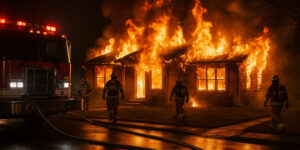Meet David French: Defender of the Faith and Defeater of Trump?
The following article was published previously by Charisma magazine in April of 2003.
Whether he’s fighting for the rights of Pentecostal teenagers, pro-life advocates or Christian college students, attorney David French says the law is on his side.
With its lush fields, gently rolling hills and genteel horse farms encircled by labyrinths of white fences, central Kentucky could pass for a Thomas Kinkade painting. Imagine, then, a new vision for challenging infringements on Christians’ legal rights originating in such an idyllic setting.
It happened.
The dispute erupted in 1997 when a resident challenged next-door neighbor Trinity Assembly of God, a church of 300 members, two miles north of Georgetown. The man claimed the noise from teen worship services at the church’s Spirit Life Center rattled his windows. He complained to the county zoning board, and soon authorities imposed rules that stifled a budding revival that had almost tripled the youth group.
But the Pentecostal church fought back. With free legal help from member David French, Trinity filed a federal lawsuit claiming religious discrimination. The next summer, a court invalidated the county’s zoning ordinance.
The victory not only freed the church to resume its use of the center, but it also sparked French to pursue his new avocation as a religious-freedom advocate. In doing so, he also secured pastor Stan Holder’s undying gratitude.
“If David wasn’t here, we would have lost that battle. It was the difference between life and death,” says the pastor, whose quiet demeanor belies the fierce battle he endured.
Even though audio readings Trinity took revealed that chirping crickets were louder outside than the youth group’s music, the church spent $17,000 on soundproofing and $2,400 for a fence to divide the properties.
That didn’t prevent the offended neighbor from blasting a recording of a chain saw at them several times. When the church went before the zoning board, a board member declared, “We can and will define how you worship.”
“If David hadn’t been with us, we probably wouldn’t be using the building for youth ministry today,” muses Holder, who has been at Trinity since it met in a refurbished house in town. “I never dreamed our church would be in the middle of this. I’m especially surprised it happened here.”
However, in an interesting twist of events, 19 months ago the church bought out the antagonistic man’s five-acre estate. The acquisition almost doubled its property and provided a 4,600 square-foot, two-story house for its offices.
This outcome fulfilled a prophetic word Holder received before the court battle erupted. One day as he drove past the church’s small “Pray to End Abortion” sign and glanced at the home, Holder says the Holy Spirit whispered, “That’s going to be yours one day.”
This may sound like a providential conclusion, but the pastor realizes the story hasn’t ended. Trinity’s battle awakened the congregation to others that have fared worse, including an Assemblies of God (AG) church in nearby Lexington–the state’s second-largest city–that withered away in the midst of zoning disputes.
Though Holder remains confident in Christ’s promise that the gates of hell will not prevail against His church, the struggle showed him that sometimes His children must stand and fight.
“I’m not a fighter by nature, but there are times you have to take a stand. You have to be willing and courageous to stand up for grace and truth. If you ignore things, they won’t go away.”
Legal Showdowns
French, 34, a former Cornell University law professor, includes in his recent book, A Season for Justice, an extended account of the Kentucky events as well as a more highly publicized battle at Tufts University in 2000. The latter saved the Tufts Christian Fellowship from being booted off campus.
It also led to French’s appointment as counsel for the Religious Liberties Crisis Team of InterVarsity Christian Fellowship (IVCF), an international campus ministry. IVCF general counsel Ralph Thomas calls French “very knowledgeable” and his work an encouragement to other chapters facing overbearing administrators.
“We haven’t convinced anyone in the gay and lesbian community that we have the right to select our own leaders,” Thomas says, referring to the issue that caused the showdown at Tufts. There, when outgoing officers didn’t select an avowed lesbian as an InterVarsity leader, she claimed discrimination.
“Administrators at universities haven’t jumped on the bandwagon either,” Thomas adds. “They want every organization to comply with nondiscrimination criteria. If an organization can’t set its criteria for leadership, it loses its identity. It’s like having a trombone player at quarterback.”
That doesn’t stop them from trying. After a quiet 2001-2002 school year, several challenges to IVCF surfaced last fall. The most flagrant involved Rutgers, a state university that contemplated a ban on “proselytizing.”
While the administration had backed away from that stance by mid-autumn, in late December IVCF sued Rutgers, challenging the university’s refusal to grant it recognition or funding. The dispute was rooted in IVCF’s refusal to comply with Rutgers’ nondiscrimination policy.
Although in late March the university tentatively agreed to settle the case–a victory for IVCF–the issue demonstrates the continuing impact of such policies.
Ironically, French believes homosexuals ought to be welcomed by any group–it’s one among several of his ideological departures from traditional, conservative Christian stances. A religious-freedom handbook he co-authored for IVCF includes the Tufts’ chapter’s constitution, which lists sexual orientation among its nondiscrimination provisions.
The attorney emphasizes that anyone can hear the gospel, but chapters must be free to set criteria for leaders. He draws that line because IVCF wants visitors to hear the gospel from mature Christians.
“People would say [admitting homosexuals] is compromising,” French says. “It’s actually not compromising at all. It’s just this particular organization says anyone can come. If I was to represent another Christian organization who wanted to restrict their membership policies, I would help them do that because they have the free associational right to do it.
“It depends on the group’s purpose. If the purpose is evangelism, I wouldn’t see it as very sensible to discriminate amongst who you’re going to allow to join. If the purpose is discipleship … I could see a compelling reason to discriminate.”
Nor are these fights restricted to campuses. The Lexington attorney foresees them as being a leading religious-freedom issue. Such laws also are being used to silence Christians at work and deny funding to Christian-based social organizations–an application he says has scarier implications.
French sees America favoring anti-discrimination laws over freedom, which ultimately could threaten U.S. society’s cherished, centuries-old independence.
“As the culture’s heart changes against freedom and for these antidiscrimination laws, freedom disappears,” he says. “It disappears more for Christians than for anyone else because we maintain a standard of faith, belief and practice that is often incompatible with the sort of open-ended, ‘anything goes’ ethic embodied by a lot of these anti-discrimination rules.”
To him, the other leading issue is a parallel. Though society espouses tolerance, it is becoming increasingly intolerant of Christians. And in the aftermath of the September 11 terror attacks, the nation’s view of religion is at a crossroads, French believes.
The terrorist acts in New York and Washington, D.C., caused many intellectuals to declare the real villain to be not radical Islam but fundamentalism of any faith. He characterizes such theorists as saying that the more secular American society is, the more peaceful it will be.
Christians must come to grips with that, he says, and outlines a twofold challenge. The first is to refute the notion that a belief in absolutes inherently leads to violence. The second is to show that, in many ways, the Christian community represents the nation’s moral and cultural backbone.
“We volunteer to fight for the country. We stand, more than anyone, against this kind of Islamic fascism. We stand against it not because we want to exterminate all religious viewpoints, but out of self-defense–and because we want there to be a system around the world where there is a free exchange of ideas.”
Fighting for Freedom
With its 11th-floor view of downtown Lexington, overlooking trees, church steeples and the campus of nearby Transylvania University, French’s quiet work setting resembles a slightly upscale version of the Trinity Assembly neighborhood.
But as French points out in A Season for Justice, legal battles aren’t fought in Hollywood-like environs. Instead, the reality of litigation consists of paperwork, rare court appearances and mind-numbing minutiae.
Amid this oft-Byzantine landscape, however, the Kentucky native is blazing a trail with his stance that the secret to leveling the public-expression playing field is not in launching a power play. He argues that Christians must insist on freedom for all, confident that the truth of the gospel will overcome its enemies.
Although he eschews relying on political, legal or legislative solutions to every problem–saying the real solutions are spiritual–French acknowledges sometimes there is a need to fight. But Christians must fight smart. Too often in the last 20 years stupid tactics have harmed their cause, he says.
“I think we Christians should coalesce behind a simple, powerful argument: equality. Give us the same rights to speak that you give everyone else. Give us the same access to funding that you give everyone else. If our presentation of the gospel cannot win the day when we have the same rights, or if we are too timid to speak up once we have the same rights, that’s our problem.
“I’ve even talked to atheists who are viciously anti-Christian and have gotten them to agree with me that they may not like me, but I should have an equal right to speak. Once you can get an atheist to agree with you that you have an equal right to speak, your legal [and] political action can be unified, rather than being divisive.
“We can seek equality because we have confidence in our message. It’s the people who have the bad message who need the government to throw their weight behind them. We don’t need the government to win the souls of people. We just need the ability to speak.”
Bringing his views into a practical arena is where French parts company with such groups as school-prayer advocates and those who want to post the Ten Commandments in public. He opposes both. While he supports student-led initiatives such as See You at the Pole, he argues strenuously against government-sponsored prayer.
While that has provoked some strong reactions from Christians, he thinks it is “crazy” to pursue those goals, for two reasons:
Christians are a distinct minority. Outside of the Bible Belt, it is hard to tell what forms government-sanctioned prayer would assume in certain regions.
When Christians abandon neutrality and say the government should endorse some religious practices, it removes arguments against the sort of liberal indoctrination occurring in public schools.
“We have to live in the world today and decide how it is that we, as Christians and a minority in this culture, are going to interact with it,” he says. “The answer is not to try to recreate the 1940s.”
Because French spends the majority of his time handling commercial litigation for energy and health companies, he isn’t a well-known participant in the Christian legal community. But his views do find some backing among his peers.
“On the West Coast, I wouldn’t want my children having a nonbelieving or lesbian teacher leading prayer,” agrees Brad Dacus, founder of the Pacific Justice Institute in Sacramento, California. “There are so many faiths and teachers, and a large percentage who are not Christian, they would lead it with the wrong words or attitude.”
A former regional director for The Rutherford Institute, Dacus says the key is not to “make the dog bark like a cat,” but to enable individuals and students to be shining lights on their campuses.
He points to an after-hours revival rally held last fall at a Sacramento school, where Bibles were freely distributed and an ex-gay man shared his testimony. “Youth rallies could be replicated like that on every campus in America,” he says. “It’s not happening because people aren’t aware of their rights.”
Though Alan Sears of the Phoenix-based Alliance Defense Fund doesn’t quibble with French’s thesis, he cautions it is necessary to define what a level playing field means. For example, homosexual activists label their agenda “neutral,” and protests against it are considered “out of bounds” because they come from a Judeo-Christian ethic.
“To the radical homosexual advocates, level is when they win and the gospel is silenced,” Sears adds.
Taking Action
While French fights for the rights of everyone to speak, he says it is up to Christians to follow through. He isn’t encouraged by what he sees, noting that “hot buttons” such as school prayer and the Ten Commandments get far more attention than serious issues, particularly the 2002 Supreme Court ruling that upheld the legality of tax-funded vouchers for private schools.
Instead of constantly bemoaning public schools’ “monolithic, left-liberal” view of education, he says those who want to make a difference should establish competition, be that through a parochial, evangelical or charter school.
“If Christians put their mind to education [and] their hearts into educating the next generation, we could have a phenomenal education network,” French says. “With this voucher decision, the theoretical ability to impact our culture is unbelievable.”
In addition, he says changing conditions call for vigilance and staying informed about local educational and governmental policies, as well as crafting better arguments that the culture finds persuasive. French says it is inadequate to quote a Scripture and think that settles the argument, especially when so many people have no biblical knowledge.
It would be “incredible” if every elementary, middle school and high school in America had a Bible club, but he points out that requires a huge commitment. He says that instead of griping about this decadent society Christians should be working to change it–while remembering the law can’t bring life.
“The only thing that can make our communities moral is if Christians evangelize and change hearts from the inside out,” French says.
“I think the message is simple. It’s not a hard solution intellectually. It’s a hard solution to execute. Equality.
“Let’s have the same rights to speak as everyone else in this culture and then watch the culture change as we have the courage to exercise those rights.”
Transformed by the Spirit
Religious-freedom defender David French says his faith was energized when he was baptized in the Holy Spirit as a student at Harvard Law School.
Growing up in a Christian home, David French can’t remember the specific time he asked Jesus to be his Savior. But he will never forget being baptized with the Holy Spirit during his second year at Harvard University Law School.
After attending college in Nashville, Tennessee, the Kentucky native wasn’t prepared for the anti-Christian hostility he encountered in Cambridge, Massachusetts. The first article he read in Harvard’s newspaper argued that Jesus’ 15 minutes of fame were over, and it was time to move on.
Eager to meet other Christians, he got involved with the law school’s inter- denominational fellowship, which included Catholics, Baptists, Presbyterians and the Assemblies of God. In the group, French studied Scriptures about the gifts of the Holy Spirit.
As he observed some charismatic classmates and friends, he was amazed at the effect the Holy Spirit had on their lives. One day a friend called to say, “The Lord laid you on my heart,” a signal to him that he should shed resistance to their ideas.
That night, before a fellowship meeting, he went to an empty classroom on campus. Three members prayed for him, stirring an intense personal encounter with the Holy Spirit.
“One thing that did was remove a lot of doubt from my life,” says French, who grew up in the Church of Christ. “Before that, every now and then thoughts would float through my mind: Is this real? Is there really a God?
“After I was baptized with the Spirit, I can’t recall a single time since then that I have encountered doubt on these fundamental issues. With that unshakable confidence behind you, it’s amazing how it transforms your life.”
In his case, it led to another dramatic incident two years after graduation. After being diagnosed with chronic ulcerative colitis–an incurable disease that caused him to lose 15 pounds–he cried out to God for healing.
“And I was healed,” says French, who provided Charisma with copies of his physician’s letters verifying his account. “The doctor did a colonoscopy after I had gained all my weight back and was healthy again. He [said], ‘I don’t think you have chronic ulcerative colitis.'”
“What about my future insurability?” the young attorney asked. “Everyone thinks I have chronic ulcerative colitis.”
“I’m going to write a letter [saying] that you don’t have that,” the doctor replied.
Not All Lawyers Are Liberals
David French has found some unlikely support from a secular organization that has fought to defend pro-life groups and Christian students.
Christians weren’t the only ones opposing Tufts University’s attempt to boot the local InterVarsity Christian Fellowship off campus three years ago. The Foundation for Individual Rights in Education (FIRE) played an active role in stirring up media coverage that generated nationwide controversy.
FIRE, which was founded by University of Pennsylvania law professor Allen Coors and Harvey Silverglade, a lawyer with the American Civil Liberties Union (ACLU) in Boston, is a secular organization that has played a significant role in safeguarding Christians’ rights. In January, the foundation issued its Guide to Religious Liberty on Campus, which was written by David French.
One of its most recent battles was securing recognition last October for a pro-life student group at Washington University, after two refusals by the student bar association.
“I don’t think of people wanting to silence Christians as liberals,” says Chief Executive Officer Thor Halvorssen, who is not an evangelical. “I think of them as totalitarians and hypocrites.
“It’s unquestionable that the assault on the rights of conservatives and Christians is done in the name of liberalism. That’s to the shame of many well-meaning liberals, who should stand in line to defend the rights of evangelicals.”
Halvorssen also doesn’t believe in putting “conservatives vs. liberals” labels on such controversies. Though he formerly worked at a conservative think tank, the FIRE official believes liberals also oppose censorship, pointing out that the ACLU of Eastern Missouri joined the FIRE case against Washington University.
Nor are Christians the only targets. Essentially anyone who is irreverent, eccentric, unorthodox or challenges reigning ideas that dominate a campus come under attack and scrutiny, he says.
Christians, however, are singled out more than any other person or group, he says, particularly by heavy-handed forces seeking to enforce anti-discrimination rules. He calls such regulations a patchwork of bizarre, inconsistent policies that would not withstand a constitutional challenge.
Much of FIRE’s work consists of calling attention to such violations.
“We’re not forcing anybody to do anything,” Halvorssen says. “All we’re doing is making a moral stand, and when that doesn’t work, that’s where someone like David French comes in.”
Classroom Watchdog
Attorney Brad Dacus, author of Reclaim Your School!, is helping parents and students fight an anti-Christian agenda in American education.
Watching principals prohibit students from using the word Bible in announcements about their Christian clubs, censor words such as Easter and Christmas, and ignore the federal Equal Access Act moved Brad Dacus to words.
Last August, he and his wife, Susanne–a former youth minister–released Reclaim Your School!: 10 Steps to Practically and Legally Evangelize Your School (Pacific Justice Institute). In two months they sold 2,000 copies of the book, without national advertising or media promotions.
“It’s one thing for us to kick the bad guy off the hill and another thing to equip people to take the hill that’s there for the taking,” says Dacus, a charismatic and former representative for The Rutherford Institute. “There’s very little to … equip students and parents to retake their schools for Christ.”
He hopes to obtain a grant to allow free distribution of his book at youth ministers conferences nationwide. The book reviews such topics as students’ rights under the law, how to start a Bible club on campus, evangelism at school, parents’ opportunities to share their faith and practical ways to give a testimony.
Dacus, who has filed numerous lawsuits against school districts, including one district that sponsored a pro-gay student assembly without informing parents, advises taking an aggressive stance in this arena.
“If Christians did everything they could that our book discusses–at every public school–we would have liberals and the ACLU campaigning for vouchers,” he says. “I say that with a smile, but with seriousness, too. There’s so much in the way of opportunities.”
Ken Walker is a freelance writer based in Louisville, Kentucky. He has written about legal and political issues for the last 30 years.




























































